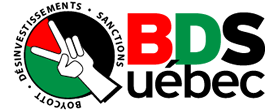On November 26, 2015, in Montreal, I interviewed Sabine Friesinger, who is member of the Coordinating Committee of the Quebec BDS Coalition, to discuss Quebec BDS Coalition activities, challenges, and on-going projects.
What is the BDS Movement?
BDS Movement is the result of 2005 Palestinian civil society’s call for a "campaign of boycotts, divestment and sanctions" against Israel in an effort to denounce its violation of international law and Palestinian rights.
What was the Quebec BDS campaign during the 2015 federal elections?
Quebec BDS Coalition was concerned that all main Canadian political parties were ignoring Israeli-Palestinian issues during the electoral campaign. In order to bring them back to the electoral agenda, the Coalition registered as a Third Parties with Elections Canada. This official registration allows it to publicly advertise in order to raise awareness. They did so through the use of posters, which were put in various public spaces in Montreal city. Part of their strategy was also to target specifically Liberal, Conservative and NDP political offices.
The campaign was meant to provoke reactions: the poster shows a child that has been killed by Israeli’s fire, and states that Israel kills children. Inviting political parties to take position, it further asks: "Harper applauds, what do other parties have to say?"
As part of this campaign, there was a solidarity event planned on September 25, 2015 that was finally cancelled. What happened?
While some members of the team were putting posters around Thomas Mulcair’s political office, a growing crowd gathers around BDS militants. The crowd was mainly composed of Hassidic Jews, and they were very unhappy about both the visual and the content of the poster, accusing BDS of inciting to racial hatred. Tensions raised as both sides argued. During the altercation, BDS activist were victims of harassment and even physical assault. Police officers had to intervene in order to disperse crowds and avoid further violence.
Such an event illustrates well issues associated to civil activism for Palestinian’s rights, even in a democratic state such as Canada. Also, it is worth mentioning that, following a complaint against BDS electoral campaign, Election Canada reviewed the poster (and its content) and ruled that it was not an "incitation to hatred violence".
This happened a week before the Solidarity event that was planned for the following Friday, September 25, 2015. Due to the violence of this incident, and to threats that were received on social networks, BDS Coalition simply decided to cancel the manifestation.
How the change of government is perceived by your organization? Do you think it will have a positive impact on your activities?
The change is welcomed. However, it is too early to know what will be the new government’s position on these issues. For instance, Justin Trudeau, before being involved in Canadian politics, had declared that he was opposed to BDS movement while McGill University students were voting to adopt a resolution in support of it. However, our organization firmly believes that significant changes are contingent to civil society activism and that we can, together, make a difference. In this sense, our campaign for Palestinian’s rights is very advanced, and we are confident that civil society may exert considerable pressure to impede this culture of impunity that prevail when we speak of Israel’s actions toward Palestine.
The European Parliament has expressed its support for differentiating labels of goods between Israel and settlements. What do you think of this initiative? Is it something that could be done in the Canadian context?
Definitely, this initiative is a step forward, and seen very positively. Regulations about labeling are different in Canada, and to implement such a change might be challenging. Nevertheless, it is a great step in the right direction.
What are your ongoing projects and initiatives?
The Palestinian BDS National Committee (BNC) has issued a call for a "comprehensive embargo on military cooperation". We plan to support them through our campaign and in our activities during the World Social Forum that will be held in Montreal, during the 2016 summer. The Quebec BDS coalition is dedicated to work with civil society, and a bottom-up perspective is at the heart of our militant agenda.
Can you tell me more about what entails this "comprehensive embargo on military cooperation"?
First, it is important to point that in addition to Canada’s almost unconditional political support to Israel, military and economic cooperation between the two countries has been increasing. For instance, since the 1997 Free Trade Agreement (CIFTA) that eliminated tariffs on industrial and military products, bilateral trade between the two countries has more than doubled, passing from 507.3 million in 1996 to 1.4 billion in 2013. Moreover, recent negotiations in 2014 led to the signature of a Memorandum of Understanding (MOU) between the two countries, which involves extending defense relations, strengthening anti-terrorism cooperation, and a broadening of the free trade agreement.
We support the call for an extensive military embargo, as we strongly believe that Israel’s numerous violations of international law are unacceptable. Consequently, we are currently working with civil society groups and partners to elaborate our strategy. Among our objectives, we want to pressure Canadian companies and research groups (e.g. CAE Inc., Centre of Excellence on drones, Quebec universities) in order that they cease all military contracts and direct or indirect cooperation with Israel’s military companies.
Our campaign will be structured around three priorities: 1- Continuing to document and research the impacts of private and public military cooperation; 2- Working to increase awareness and knowledge about these issues in civil society; 3- Various direct actions (mobilization, active participation) in order to challenge the ruling political class.
 Log in
Log in









